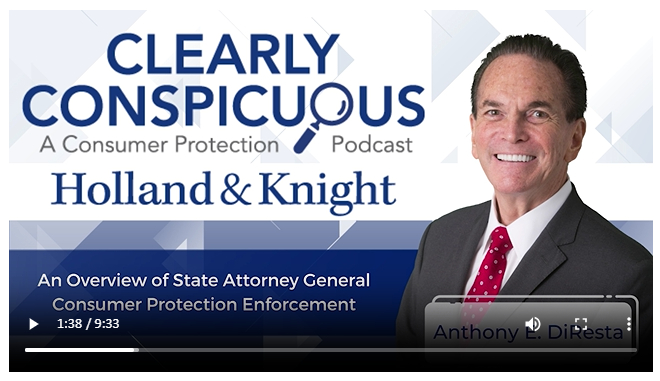In this episode of "Clearly Conspicuous," consumer protection attorney Anthony DiResta discusses recent actions taken by state attorneys general (AGs) in the enforcement of consumer protection laws and regulations. His overview covers enforcement actions regarding deceptive advertising and fees in industries including Big Tech, social media, health and consumer products. Mr. DiResta reminds his listeners that state-level protection laws help provide a foundation for regulatory oversight, despite the shifts in federal enforcement priorities that can occur during the transition to new political administrations, meaning companies still need to stay aware of changes in compliance requirements that may affect their operations.
Listen to more episodes of Clearly Conspicuous here.
Podcast Transcript
Good day and welcome to another podcast of Clearly Conspicuous. As we've noted in previous sessions, our goal in these podcasts is to make you succeed in this current environment, make you aware of what's going on with both the federal and state consumer protection agencies and give you practical tips for success. It's a privilege to be with you today.
Today, we discuss the role of the states and the state attorneys general's enforcement of consumer protection laws and regulations. As a new political administration takes office, some businesses may assume that a likely shift in federal enforcement priorities, particularly at the FTC, signals greater freedom to engage in aggressive or borderline advertising or other kinds of tactics. Regardless of how active the FTC becomes under new leadership, state attorneys general have already shown their willingness to leverage their broad consumer protection mandates through independent actions or multi-state coalitions. By examining recent enforcement actions, businesses can gain valuable insights into the evolving landscape of consumer protection enforcement and take proactive steps to ensure their advertising and marketing practices are compliant with state regulations and enforcement priorities. So let's now look at noteworthy enforcement actions by industry.
Big Tech and Online Platforms
Let's now look at big tech and online platform enforcement. In a landmark multi-state case, led by the New York and Tennessee AGs, the maker of TurboTax agreed to pay $141 million to settle claims with the AGs of all 50 states over similar claims that its ubiquitous free tax filing ads were deceptive. The states alleged that TurboTax lured customers with promises of free filing that most users did not qualify for, forcing them into paid products. The company denied wrongdoing but stopped running the misleading, quote, "free ads" as part of the settlement. Millions of low-income consumers nationwide received restitution checks from the settlement in 2023.
Next, 40 state attorneys general reached a record-setting $395 million privacy settlement with Google in November of 2022. The coalition investigated Google's location services and found the company had misled users about location tracking in Android settings. Users were led to believe disabling location history would stop Google from tracking them, while Google continued collecting location data through other means. The settlement — the largest ever multi-state privacy deal — required Google to improve its location-tracking disclosures and user controls.
Next, Texas Attorney General Paxton secured an $8 million settlement with Google over deceptive radio advertisements for the Pixel 4 smartphone. Google had hired radio DJs to deliver personal testimonials about the Pixel 4's features, even though the DJs never actually used the phone. This practice violated Texas consumer protection laws. Texas AG Paxton also announced a preliminary agreement to settle a privacy infringement lawsuit against Google for $1.4 billion. Texas sued Google, alleging it unlawfully tracked and collected users' private data, including geolocation.
Social Media Platforms and Marketing Practices
Next, let's now look at social media platforms and marketing practices. State AGs have increasingly scrutinized social media platforms and their marketing practices, especially where youth are at risk. In the last two years, a wave of state-led lawsuits accused social media giants of deceptive practices related to user safety, mental health and content. States such as Florida, California, New York and Texas have been very active in bringing actions against social media platforms. For example, Meta (Facebook or Instagram), the youth harm lawsuits in 2023, and Texas obtained a $1.4 billion settlement with Meta in 2024.
And then there was TikTok misleading safety claims — and I'll talk about this a bit more. In October of 2024, 14 states, led by California and New York, filed separate enforcement actions against TikTok, accusing the platform of exploiting young users and deceiving the public about the platform's safety and mental health impacts. The complaint asserts that TikTok's features, including beauty filters, autoplay, endless infinite scroll, stories, lives, push notifications, and likes and comments all contribute to a platform that exploits children.
Health and Consumer Products
Next category, let's look at health and consumer products. Protecting public health has recently become a major priority as states have clamped down on false advertising of products that affects consumers' well-being. There are settlements in 2022 and '23 with Juul e-cigarette's marketing, and specifically what happened there, e-cigarette maker Juul Labs faced a barrage of state enforcement for its role in the youth vaping epidemic. In September of 2022, 34 states and territories reached a $428 million settlement with Juul. And in April 2023, another six states, including New York and California, plus D.C., settled for $462 million.
Then there was the Prevagen memory supplement trial in 2024. New York's AG won a significant trial verdict against the maker of the supplement Prevagen for fraudulent, quote, "memory improvement," close quote, claims. In May of 2024, after a two-week trial, a federal jury found that the company deceptively advertised Prevagen with unsubstantiated promises such as reducing memory loss and supporting brain function, without reliable scientific evidence.
Deceptive Pricing, Fees and Services
Next category is deceptive pricing, fees and services. A broad trend in state enforcement has been targeting hidden fees, bait-and-switch tactics and other misleading pricing and consumer transactions. In the last few years, states have pursued a junk fee crackdown along with other actions to ensure clear and honest advertising of prices and services. There's, for example, education and training scams: A coalition of 11 state AGs, led by Oregon and Washington, teamed with the CFPB to sue Prehired, an online tech sales training program, for deceptive marketing in contract practices.
Concluding Thoughts
So folks, that's a brief overview that demonstrates that the little state FTC acts provide a foundation for regulatory enforcement actions. Thus, even putting federal enforcement and regulations aside, compliance management is needed. It's that simple. In our next session, we'll look at specific states to see who's acted these days. So please stay tuned to further programs, and I wish you continued success and a meaningful day. Thank you.
The content of this article is intended to provide a general guide to the subject matter. Specialist advice should be sought about your specific circumstances.


